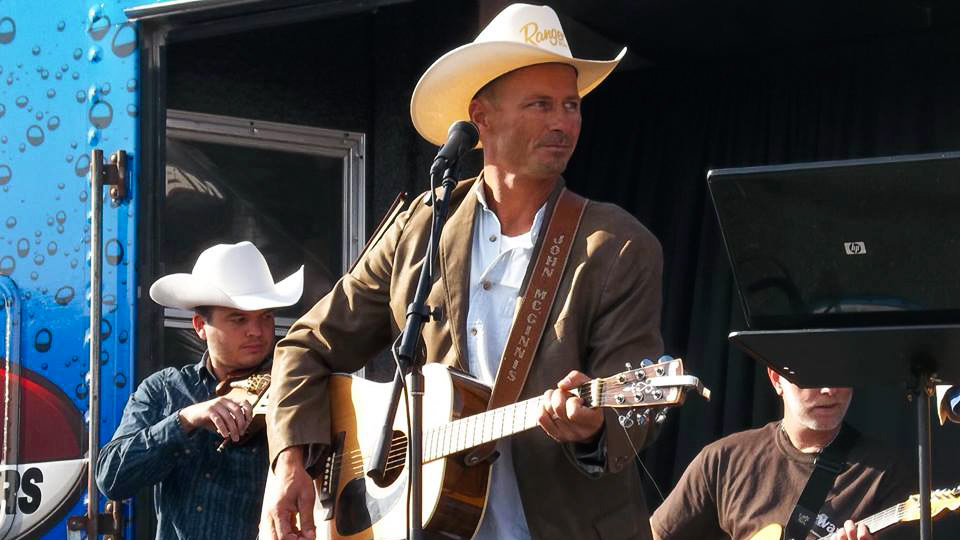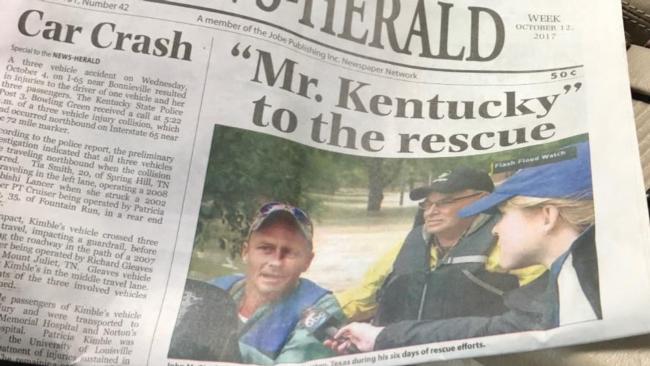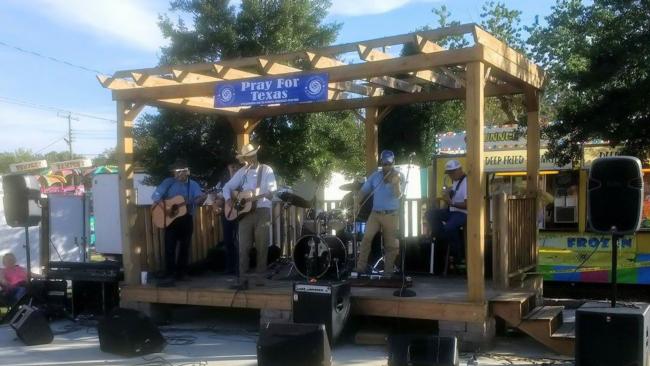Terror, Destruction and Grace Fuel Fisherman Through the Storm
John McGinnis used a bass boat to rescue hundreds in the aftermath of Hurricane Harvey

A few weeks ago, John McGinnis was skirting the edge of one of the worst hurricanes to ever ravage Texas. He’d already dealt with a malfunctioning truck, a flat tire and 18 hours of hard driving when he saw a hand waving through the window of a nearly submerged car that had run off the road. Without thinking about it, he stopped and helped a man, woman and baby escape from a ditch alongside Interstate 45. It was the start of an extraordinary journey for him where McGinnis helped dozens of people escape harm’s way.
Some of McGinnis’ story has already been told. During the seven days he braved Hurricane Harvey’s floodwaters in his fiberglass bass boat, the former FLW Tour pro earned national fame as “Mr. Kentucky,” a viral video sensation that swept the nation thanks to an ABC news report. He attracted thousands of video views on social media, and garnered a personal invitation to the mansion of Texas Gov. Greg Abbott.
All that aside, McGinnis says the news reports missed the real story. He says that tale – one of terror, destruction and grace – has yet to be told in full.
A call to act
As Hurricane Harvey made landfall on Aug. 25, John McGinnis watched the television reports in his rural home in Clarkson, Ky., and grew dismayed. He tried to sleep that night, but McGinnis, a devout Christian, couldn’t shake the images of devastation from his mind. He felt moved to go, as if God was telling him to get to Houston, he recalls. And within a few hours his wife, Stephanie, had a suitcase packed and ready for him.
They’d practiced a similar routine of preparing for road trips before, when McGinnis spent two seasons on the FLW Tour. This time, though, he wasn’t going to water in search of bass, but rather in search of people.
“I was lying in bed watching the news,” McGinnis recalls, “I said to myself, ‘My God, they [authorities] told these people not to leave, and there’s a raging river going through town. They’re going to drown.’”
By the time the former pro angler – now a construction contractor – reached that first flooded car on Interstate 45 near Conroe, Texas, he was still miles from downtown Houston. But, McGinnis says, divine intervention had already set him on the path he was to take. Hours before, engine failure had forced his truck to the road’s shoulder. There, he just happened to roll over a perfectly placed board with exposed nails that punctured the tire on his boat trailer.
“A guy named Roger from R&M Towing in Henderson towed my truck and my trailer,” says McGinnis. “He had four guys working three hours to fix it and wouldn’t let me pay him a dime when they were done. If I had been a minute later or any sooner getting to that car, those people either wouldn’t have been in the ditch or it would have been too late.”
Farther down the road, Interstate 45 dead-ended into floodwaters near Houston. There, police were blocking the highway, forcing vehicles off of the road.
“There were propane tanks floating by, pieces of houses, roofs – basically anything and everything that was in peoples’ yards. It was all washing down this route; telephone lines were underwater, and the current was so strong that a 50-hp motor couldn’t move up it.
“I started looking for anywhere I could put a boat in,” McGinnis says. “The police weren’t letting people launch. There were thousands and thousands of people from all over the country, but the police wouldn’t let them launch because the water was electrified and they told everyone to bring johnboats.”
Nearby, McGinnis was able to launch his boat into the floodwaters. His boat, with its 250-hp outboard motor, gave him an advantage. From a subdivision near Interstate 45, he began a search that took him under the shadows of Houston’s skyscrapers, and even into the attics of the city’s houses.
Tornado warnings that first day increased the challenge.
“They were telling people to get on the roof of their houses, but people didn’t want to do it because of the tornados,” McGinnis says. “So, they’d crawl into their attics.”
As the water rose – Harvey dumped more than 52 inches of rain in the Houston area in two days – McGinnis was forced to cut through residents’ roofs with a chainsaw to extract them.
“People were getting electrocuted,” says McGinnis. “A lot of it didn’t make the news, because the news people weren’t in the water. They were just sitting on the bank.”
The search
McGinnis says he saw unoccupied, capsized johnboats throughout the area and no sign of the people who’d been operating them. But over the course of a week, in his bass boat, McGinnis followed the path of the storm along the coast from downtown Houston to small cities and towns such as Conroe, Cypress Creek, Beaumont and Port Arthur. Near the town of Silsbee, he rescued 14 horses from a locked stable.
McGinnis stayed out past curfew, following the screams and yells for help of people still trapped in the flood. He figured the purpose he was serving was worth the risk of being apprehended.
At times, McGinnis would navigate floodwaters at 55 or 60 mph, “because you’ve got to be going faster than the water you’re in to have boat control,” he says.
Subsurface conditions ranged from bad to worse, with depths changing dramatically in a matter of seconds as he traversed hills and rivers. In places, the water looked much the same as the surface of a lake, but below drowned semi-trucks, houses and telephone poles maintained the threat of catastrophe.
Without local knowledge of the area, he relied on the breadcrumb trail provided by a Lowrance chart-plotter to guide him to and from his launch points.
“I promise you, had I not fished with FLW all those years, I would not be talking to you right now,” he emphasizes. “I can see how God put me in basic training from Lake Erie to Okeechobee.”
At the end of the day, McGinnis would sleep in his truck. With gas in short supply, he’d sometimes refuel his rescue boat from the tanks of abandoned cars. And he constantly worried about the possibility of electrocution.
McGinnis says he knows the final number of people he rescued, but won’t release it.
“The reason I haven’t told anyone is that I feel like the people who came and rescued one person or five people had their heart in the same place as mine,” he says. “Maybe they weren’t able to do as much as they wanted to because they didn’t have the equipment, but their heart was in the same place.”
More work to be done
Now, two months after Harvey’s landfall, McGinnis is back home in Kentucky, sleeping in the same bed he jumped out of that August night when he saw his mission clearly. Now he’s dreaming about fishing on Kentucky Lake, and trying to coordinate a meeting with Kentucky Gov. Bevin, who McGinnis says has promised to do more to help the victims McGinnis rescued. Many of those victims, McGinnis says, are homeless.
McGinnis keeps in touch with them, and he reports that many are sleeping in their yards – still victims of the storm’s $190 billion trail of destruction.
“They have no place to go,” he says. “Those without flood insurance, they’re handed $400 and told to go on their way. They can’t send their kids to school because they can’t take a shower. They are sleeping in the yard surrounded by rattlesnakes. The people who have tents are sleeping in tents, but these people are still homeless. Everyone sends food and water, but in the Texas sun – in the heat – it just takes a day before the food spoils.”
McGinnis says providing shelter is goal number one. He’s hoping to raise money via GoFundMe to help rebuild some of the homes himself.
“I don’t want to make a penny,” he says. “I just want to buy materials, pay some of my workhands, and take my family down there for the winter and build houses back.”
Right now, “Mr. Kentucky” has raised $1,300 or so – about enough cash to build a porch, he says. But he’s hopeful that he can raise more awareness in the coming weeks to boost that amount. And, he says, despite the horrors of Harvey, he’s encouraged by what he witnessed.
“It was complete devastation out there,” he says. “But you know what I saw? I saw the best of humanity. There was nothing to eat. No stores were open. There was nowhere to sleep. But everyone was helping. There were thousands of people that came in from all over who got no credit. I tell you, if you believe in God you can make a difference. If you believe, He will make a way for you. I know that, because out there I saw the best of people.”

